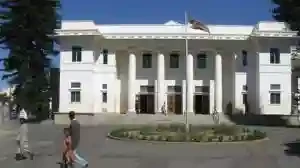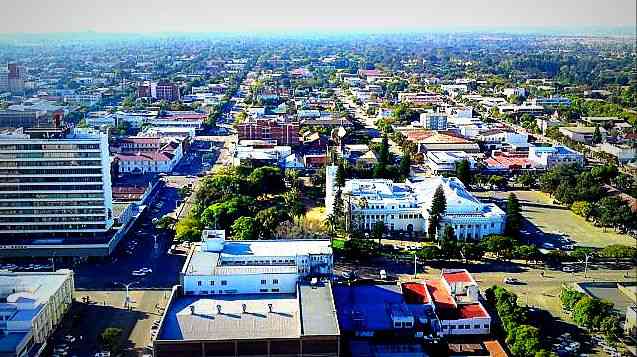INSIDE Professor Kelly Chibale’s office the bookshelves are packed with awards. On the walls, framed photographs include his class photo at Cambridge University, dated 1989.
Chibale is a professor of organic chemistry and founder of the pioneering Holistic Drug Discovery and Development Centre (H3D) at the University of Cape Town.
While many important clinical trials have been conducted by Africans in Africa, the kind of drug discovery work Chibale is doing is rare on the continent.
Chibale relays how he sees molecules everywhere — in hair, in clothes, in all of life around us. His animated voice fills the space as he speaks. “With organic chemistry, we are very visual. We look at chemical structures. If you give me a chemical structure, oh my goodness, my head starts racing about what I can do with it, or how I can change it to create new properties or new materials.”
H3D has 76 staff members investigating novel chemical compounds that could become new lifesaving medicines, with a focus on malaria, tuberculosis and antibiotic-resistant microbial diseases.
Effectively a small biotech company embedded within the university, H3D’s most notable discovery to date is a compound in 2012 which they named MMV390048, and which had the potential to become a single-dose cure for malaria. In phase I clinical trials MMV390048 was tested on human volunteers in South Africa and Australia.
“In Australia the testing model used is a volunteer infection study where human beings volunteer to be injected with the malaria parasite, which they know can be treated using available medicines,” says Chibale. “And then a section of those are given the experimental drug. And it worked beautifully there.”
‘Fail your way to success’
He adds: “People don’t realise this – there’s no medicine that will be given to people if it wasn’t tested on people first. Even me as an African. Oh man, I suffered from malaria as a child in Zambia many times.
Thanks to our government then I’d be taken to a health facility and get malaria tablets, which I took and got well again. Otherwise, I would have died.
Malaria kills very quickly. Now this is something I didn’t know then, something I took for granted. Only much later in life did I realise, goodness, the medicine I took — someone, somewhere invested in its research and development. And someone, somewhere, another human being volunteered for that drug to be tested on them for my benefit.”
In 2017, the compound made it to phase 2 clinical trials in patients with the disease, but further development was halted in 2020 when extensive further tests showed toxicity signals in rats — not rabbits though, Chibale says, adding that they had to err on the side of caution.
“In drug discovery, you have to kiss many frogs before you meet the prince,” he says.
“Many drugs fail to progress. People focus on one product that makes it onto the market, right? But there are many failures that don’t even see the light of day. In this industry you fail your way to success.”
Their work continues. In April 2022, at a function at Cape Town’s Vineyard Hotel, multinational pharmaceutical company Johnson & Johnson announced H3D as one of its three satellite centres for global health discovery.
The others are in London and Singapore. At the time, J&J stated: “Driven by some of the leading researchers in Africa and discovery science, the satellite centre (H3D) is focused on outpacing the rising threat of antimicrobial resistance by accelerating innovation against multidrug-resistant gram-negative bacteria.”
Seated at a boardroom table in his office, Chibale laughs deep from his belly. “We associate Johnson & Johnson with baby powder, but there’s much more…”
His left arm is in a sling following shoulder surgery — an injury stemming from lockdown when he slipped and fell while hiking on Table Mountain. “It happened just here, above the university,” he gestures, with his other arm.
Chibale and his wife Bertha live on the university’s campus, where he has served as warden of the Upper Campus Residence, formerly Smuts Hall, since 2015. Here he weathered the #rhodesmustfall and #feesmustfall protests, during which students torched vehicles and police deployed stun grenades a stone’s throw from his home.
Referring to his injured arm, he says at least his writing arm wasn’t hurt and that he can still type with one hand.
From a village in Zambia
Mentions of gratitude underpin the story of his journey, which starts in a village without electricity or running water in Zambia’s Mpika district. His father died when he was two months old. Laughing, he relays how hearing in his one ear is still impaired after being ambushed as a kid while stealing mangoes.
“This was a township,” he says. “So I’m climbing up a tree to steal mangoes and I was coming down. This gang, or, well, guys who were playful, had surrounded us. There were only about four of us, of whom three managed to escape.
And I was the only one left. Oh my goodness. And they took a big rock and smashed it to my ear. And then, when they saw me bleeding, they actually ran away; they were so scared of the damage they had done. Oh, that day! Anyway, so I went home and lied to my mother and said, no, I went to school and tripped over a hole.”
During high school classes, thanks to an excellent teacher, he became fascinated with chemistry experiments. He went on to study organic chemistry at the University of Zambia, where he fell in love with the logical nature of organic molecules.
“These things cannot be planned. I simply fell in love with organic chemistry, in the same way I fell in love with my wife, Bertha,” he says.
From early on he realised education was a way out of poverty. “To get out of poverty, you either play sport or you follow education,” he says. “So I started applying for scholarships, writing letters to universities around the world. And I got rejected. I kept applying and kept on being rejected. But I didn’t give up. I kept applying.”
His first job was at Kafironda Explosives in the mining town of Mufulira, on Zambia’s Copperbelt, where he made detonators, dynamite and other explosives for use in Zambian mines.
Laughing, he says this would haunt him later while applying for a visa to enter the US.
“There was a section on the form where you had to declare whether you’ve worked with explosives,” he says. “Of course I said ‘yes’, and fortunately nothing happened.”
During two years at Kafironda he continued applying for scholarships. “And I remember this,” he says.
“It was January of 1989. I got a letter saying you have been shortlisted for a Cambridge Livingstone Trust Scholarship. Please present yourself for an interview on the 26th of January at the Anglo-American Corporation offices in Harare, Zimbabwe… So, that was my first time out of Zambia. The first time to fly on an aeroplane.”
‘This was my turn’
Competition for the scholarship was tight, with shortlisted candidates from several African countries. “So, in that year, there were six of us from Zambia, from different disciplines.
I was the only scientist. And of course I’d been failing all this time, getting rejected. But this was my turn.
It was God’s appointed time for me. Actually, I was the only successful candidate.”
At Cambridge, without having completed an honours or master’s degree, Chibale enrolled for a PhD under the late organic chemist Professor Stuart Warren.
“So Stuart, this amazing, incredible man, just gave me a chance. I mean there was such a gap between me and my colleagues who had all done their undergraduates at Cambridge. But in life you can moan and complain about a disadvantage, or you can turn it into a challenge. I mean, the first three to six months were rough. Stuart would recommend to me that I sneak into first-year undergraduate classes to catch up. Stuart, he saw something in me that I didn’t even see in myself, and really gave me a chance.”
Chibale’s work in Warren’s lab, developing new synthetic methods for optically active molecules, helped secure his first postdoctoral position at the University of Liverpool, after which he joined the Scripps Research Institute in La Jolla, California, funded through a Wellcome Trust International Prize Travelling Research Fellowship.
“That was another miracle,” he says. “I was eligible for this fellowship only because I had lived in England for three years, which was a minimum requirement. And the scholarship was so good, it even gave me an allowance for my family. I haven’t forgotten. It was £1000 (US$1 272) per month. In those days, the pound was much stronger than the US dollar. So I went from rags to riches. In Liverpool I was walking most of the time, while in California I actually had a car!”
Over the years he was gaining insight into the pharmaceutical sector — the science but also the entrepreneurial side that pushes innovation, all the while longing to bring this knowledge to Africa. Peers suggested he consider South Africa, particularly the University of Cape Town (UCT).
Around 1994, then UCT department of chemistry head Professor James Bull made Chibale an offer to pursue postdoctoral research – which he declined.
“Because I thought there was going to be a civil war in South Africa! I remember watching the release of Nelson Mandela on TV in England, quiet, just watching.”
Towards the end of 1995, inside a copy of the British scientific journal Nature, Chibale found an advertisement for a position as a lecturer in organic chemistry at UCT and applied.
“It was a calling,” he says. The family moved to Cape Town.
Then in 2010 at UCT, with five postdoctoral staff, Chibale founded H3D. At the time his mentors included Dr Anthony Wood, former Pfizer senior vice-president and now head of GlaxoSmithKline’s research and development, who arranged for Chibale to have a four-month sabbatical with Pfizer in the UK to learn about the practicalities of innovative pharma. Thirteen years later, H3D has blossomed.
Chibale says he is a Christian as well as a soccer and boxing fan. His wife runs a Cape Town catering business called Hearts and Tarts. They have three sons.
As the interview draws to a close, he looks up at his 1989 Cambridge class photo. “You won’t believe it,” he says. “Last year I visited my college at Cambridge with my wife and second son and they pulled out a copy of my handwritten scholarship application letter, written to them from Zambia all those years back.”
This precious relic of Chibale’s journey is not in his office. He keeps it on his desk at home. — Daily Maverick.





